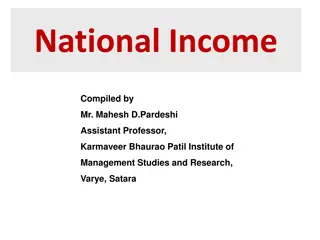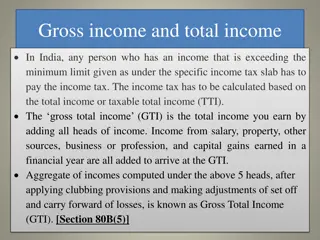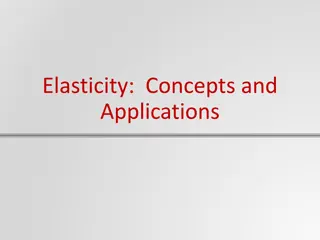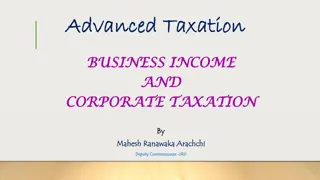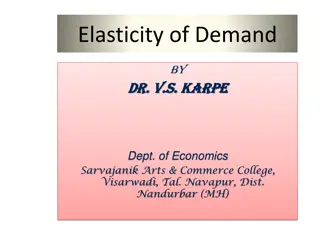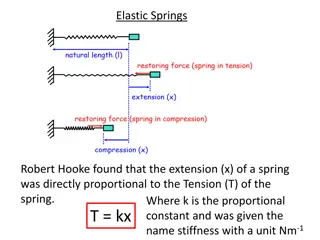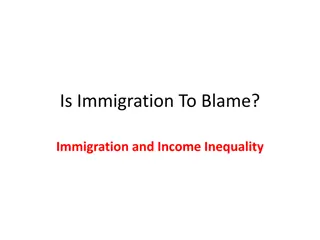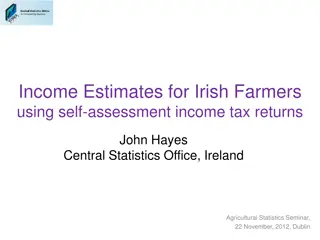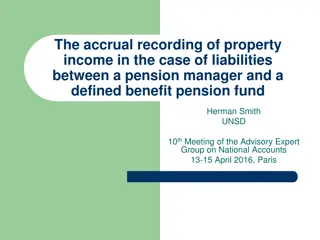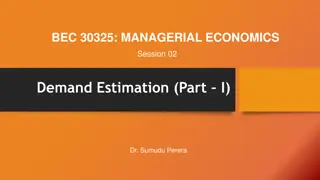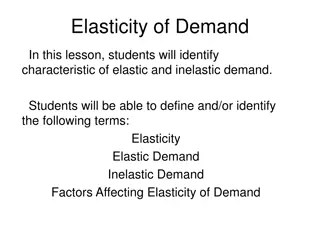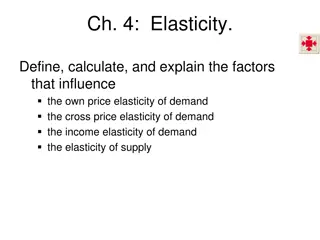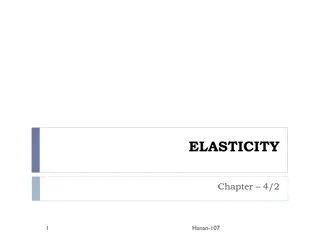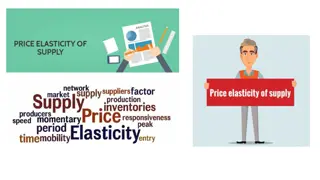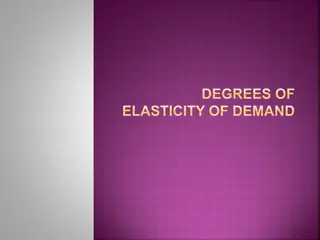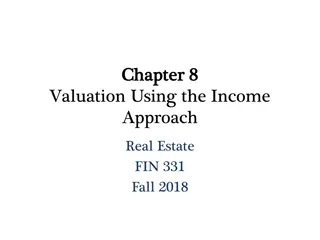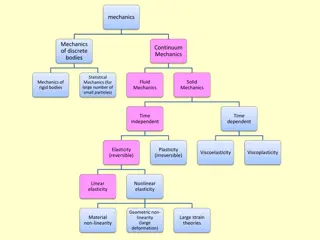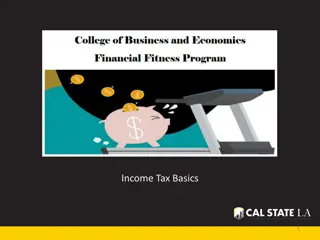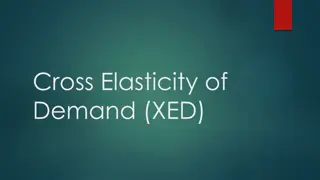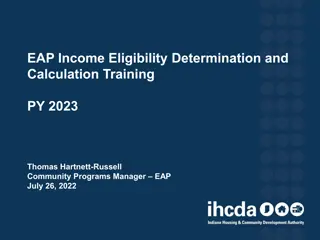Understanding Concepts of National Income in Economics
Explore the concepts of national income presented by Dr. Rashmi Pandey, covering key indicators such as Gross National Product (GNP), Gross Domestic Product (GDP), Net National Product (NNP), Net Domestic Product (NDP), Personal Income, Disposable Income, Per Capita Income, and Real Income. Gain ins
0 views • 22 slides
Understanding National Income and Its Importance in Economics
National income is a crucial measure of the value of goods and services produced in an economy. It provides insights into economic growth, living standards, income distribution, and more. Concepts such as GDP, GNP, Personal Income, and Per Capita Income help in understanding the economic health of a
5 views • 14 slides
Understanding the Income Approach to Property Valuation
The income approach to property valuation involves analyzing a property's capacity to generate future income as an indication of its present value. By considering income streams from rent and potential resale, commercial property owners can convert income forecasts into value estimates through proce
8 views • 49 slides
Understanding Consumer Demand Principles and Elasticity Theories
Explore the theory of consumer demand, including the principles of price-demand relationship, homogeneity, symmetry, and price elasticity. Delve into the concepts of own-price elasticity, cross-price elasticity, and expenditure elasticity to understand how changes in prices and income affect consume
1 views • 8 slides
Understanding Income Tax in India: Gross vs Total Income
In India, income tax is calculated based on the total income or taxable total income. The gross total income includes earnings from all sources like salary, property, business, and capital gains. Various additions such as clubbing provisions, adjustments for losses, unexplained credits, investments,
0 views • 7 slides
Understanding Tax Obligations and Assessable Income in Australia
In Australia, residents are taxed on worldwide income while non-residents are taxed only on Australian-sourced income. The tax liability is calculated based on taxable income, tax offsets, other liabilities like Medicare levy, and PAYG credits. Assessable income includes employment income, super pen
0 views • 13 slides
Understanding Price Elasticity of Supply: Degrees and Concepts
Explore the concept of Price Elasticity of Supply (PES) through definitions, descriptions of elasticity degrees, and examples like perfectly inelastic, fairly elastic, and unitary elastic. Engage in an activity to deepen your understanding.
0 views • 5 slides
Understanding Price Elasticity in Economics
Explore the key concepts of price elasticity in economics, including calculations, determinants, and applications. Understand the differences between price elasticity of demand and supply, learn how to calculate price elasticity, and interpret elasticity coefficients. Discover the responsiveness of
0 views • 31 slides
Understanding Revenue Concepts in Different Market Conditions
Explore revenue concepts like Total Revenue (TR), Marginal Revenue (MR), and Average Revenue (AR) along with elasticity of demand in various market structures such as perfect competition, monopoly, monopolistic competition, and oligopoly. Learn about short and long-run equilibrium conditions and the
0 views • 21 slides
Understanding Sri Lanka's Inland Revenue Act No. 24 of 2017
This content delves into the key aspects of the Inland Revenue Act No. 24 of 2017 in Sri Lanka, covering chargeability of income tax, imposition of income tax, definitions, sources of income, assessable income for residents and non-residents, income tax payable, and income tax base. It provides valu
0 views • 93 slides
Understanding Income from House Property in Taxation
House property income refers to rent received from properties owned by an individual, charged under income tax. It is based on the concept of annual value, representing the expected rental income or market value of the property. The annual value is taxable under the head "Income from House Property.
1 views • 12 slides
Understanding Elasticity of Demand in Economics
Elasticity of demand refers to the responsiveness of quantity demanded to changes in factors like price, related commodities, and consumer income. This concept helps analyze how demand fluctuates with price changes, with examples and calculations provided. Interpretations of numerical values and the
2 views • 25 slides
Insights on Price Elasticity of Demand and Consumer Behavior
Understanding the concept of price elasticity of demand, this content explores how changes in price affect consumers' buying behavior. It covers the Veblen effect, Giffen goods, Marshall's example on staple foods, and the responsiveness of demand to price fluctuations. The content also explains elas
5 views • 31 slides
Overview of Income Tax Authorities in India
The Income Tax Act in India empowers the Central Government to levy taxes on all income except agricultural income. The Income Tax Department, governed by the Central Board of Direct Taxes, plays a crucial role in revenue mobilization. Understanding the functioning, powers, and limitations of tax au
0 views • 14 slides
Understanding Residuary Income and Taxable Sources
Residuary income, under section 56(1), includes all income not excluded from total income and subjected to income tax under "Income from other sources." Certain specific incomes listed in section 56(2) are taxable, such as dividends, winnings, employee contributions, interest on securities, and inco
0 views • 9 slides
Understanding Clubbing of Income in Taxation
Clubbing of income refers to including another person's income in the taxpayer's total income to prevent tax avoidance practices like transferring assets to family members. This concept is addressed in sections 60 to 64 of the Income Tax Act. Key terms include transferor, transferee, revocable trans
1 views • 16 slides
Understanding Hooke's Law for Elastic Springs
Robert Hooke discovered Hooke's Law, stating that the extension of a spring is directly proportional to the tension applied to it, with a constant called stiffness. The modulus of elasticity is the inverse of the natural length of the spring. By applying the formulas derived from Hooke's Law, you ca
0 views • 40 slides
LED Market Assessment and Lighting NTG Study Findings
This document presents the findings from an LED market assessment and lighting NTG study conducted in June 2015. The study includes evaluation tasks such as demand elasticity modeling, supplier interviews, data analysis, and overall reporting. Task leaders were assigned for each specific task to ens
0 views • 27 slides
Understanding Elasticity of Demand in Microeconomics
Elasticity of demand in microeconomics explores the qualitative and quantitative relationships between demand and price. It examines how changes in various factors affect consumer behavior and demand for goods and services. Factors such as price, consumer income, prices of related commodities, numbe
1 views • 8 slides
Evolution of Progressive Income Tax Systems
The concept of modern progressive income tax, developed in the early 20th century in countries like the UK, US, France, India, and Argentina, is based on the principle of a comprehensive tax base encompassing various income categories. The system involves effective vs. marginal tax rates, different
0 views • 19 slides
Exploring Immigration's Impact on Income Inequality
The presentation delves into the relationship between immigration and income inequality, analyzing data on income distributions among voters, non-voting citizens, and non-citizens in PA. It discusses the log-normal distribution as an approximation for income distribution and examines the ratio of me
0 views • 16 slides
Analysis of Irish Farmer Incomes Based on Income Tax Returns
This paper presents an analysis of Irish farmer incomes in 2010 using self-assessment income tax returns from the Revenue Commissioners. The study focused on various income sources such as trading income, rental income, employment income, social welfare transfers, and pension income. The dataset com
0 views • 12 slides
Accrual Recording of Property Income in Pension Management
The accrual recording of property income in the context of liabilities between a pension manager and a defined benefit pension fund involves accounting for differences in investment income and pension entitlements. This process aims to reflect the actual property income earned by the pension fund, c
0 views • 17 slides
Understanding Retirement Income for Low-Income Seniors in Ontario
Exploring the income system for retirees in Ontario, including Old Age Security, Canada Pension Plan, and private pensions. Addressing the concept of low income, eligibility for Guaranteed Income Supplement, and debunking common misconceptions with a top 10 list of bad retirement advice. Highlightin
0 views • 11 slides
Managerial Economics: Understanding Demand Estimation
Explore the fundamental concepts of demand estimation in managerial economics, covering topics such as the definition of demand, the law of demand, price elasticity, income elasticity, cross elasticity, and more. Dr. Sumudu Perera provides insights on how quantity demanded relates to factors like pr
0 views • 23 slides
Understanding Elasticity of Demand and Factors Affecting It
Identify the characteristics of elastic and inelastic demand, define terms like Elasticity, Elastic Demand, and Inelastic Demand. Explore why we still buy gas despite rising prices, the concept of elastic and inelastic demand using examples like pants and apple juice. Learn about factors influencing
0 views • 16 slides
Understanding Price Elasticity of Demand in Economics
Price elasticity of demand is a crucial concept in economics that measures how much the quantity demanded of a good changes in response to a change in its price. Factors influencing own-price elasticity, cross-price elasticity, income elasticity, and supply elasticity are explained and illustrated u
0 views • 19 slides
Understanding Price Elasticity of Demand in Economics
Price elasticity of demand is a crucial concept in economics, as it measures the responsiveness of quantity demanded to price changes. A higher elasticity value indicates a more significant impact of price changes on demand. The concept helps businesses understand how changes in pricing affect their
0 views • 8 slides
Understanding Elasticity in Economics
Elasticity in economics refers to the responsiveness of demand to price changes. A more elastic curve results in larger quantity changes for small price changes, while a less elastic curve requires larger price changes to affect quantity consumed. The elasticity of demand can be measured by calculat
1 views • 13 slides
Understanding Price Elasticity of Supply in Economics
Price elasticity of supply measures how much the quantity supplied responds to changes in price. It can be inelastic (quantity supplied responds slightly), elastic (quantity supplied responds substantially), or unit-elastic (price elasticity of supply equals 1). Various determinants like the passage
0 views • 16 slides
Understanding Degrees of Elasticity of Demand
Elasticity of demand refers to the responsiveness of quantity demanded to changes in price. Perfectly elastic demand occurs when there is an infinite demand at a particular price and demand becomes zero with a slight rise in price. Conversely, perfectly inelastic demand occurs when there is no chang
0 views • 11 slides
Understanding Price Elasticity in Consumer Behavior
Explore the concept of price elasticity and its impact on consumer behavior through examples ranging from Nikes to Starbucks lattes. Learn how consumers respond to price changes and the importance of elasticity in determining market dynamics. Delve into the interactive activity provided to deepen yo
1 views • 8 slides
Valuation Using the Income Approach in Real Estate
The income approach to appraisal in real estate involves converting future income into a present value through income capitalization. This method utilizes direct capitalization and discounted cash flow techniques to estimate property value based on net operating income. Estimating net operating inco
0 views • 17 slides
Understanding Taxation in Australia: Income Declaration and Assessment
Australian taxation laws require residents to declare worldwide income while non-residents are taxed on Australian-sourced income. The tax liability calculation involves taxable income, tax offsets, other liabilities such as Medicare levy, and PAYG credits. Assessable income includes various sources
0 views • 13 slides
Understanding Set-off of Losses in Income Tax
Set-off of losses in income tax allows taxpayers to reduce their taxable income by offsetting losses from one source against income from another source. This process helps in minimizing tax liability and optimizing tax planning strategies. There are specific rules and exceptions regarding the set-of
0 views • 4 slides
Overview of Mechanics and Continuum Mechanics
Mechanics explores the motion of matter and forces influencing it, covering topics such as Elasticity, Plasticity, and Viscoelasticity. Continuum Mechanics delves into the mechanics of bodies, focusing on continuity, homogeneity, and isotropy. Understanding external forces, stresses, and elasticity
0 views • 28 slides
Understanding Income Tax Basics
Income tax is a fundamental part of contributing to a civilized society, with various taxes like sales tax, gas tax, and alcohol tax playing a role. This guide explains how income tax works, including taxable income calculations and refund processes. It also covers what amounts are taxable, such as
0 views • 14 slides
Understanding Cross Elasticity of Demand in Economics
Cross Elasticity of Demand (XED) measures how the demand for one good changes in response to a change in the price of another related good. The concept is explained through examples such as close substitutes, weak substitutes, perfect substitutes, and complementary products. It helps in understandin
0 views • 8 slides
Understanding Price Elasticity of Demand in Economics
Explore the concept of price elasticity of demand in economics through a discussion on how changes in pricing can impact revenue generation. Learn about different types of demand elasticity and how to calculate price elasticity of demand using the percentage change in quantity demanded and price. Di
0 views • 51 slides
Income Eligibility Determination Training for PY 2023
Explore the key changes and considerations in income eligibility determination for the upcoming program year 2023, including the use of State Median Income and Federal Poverty Guidelines. Learn about the refined definition of the income eligibility period and the importance of monitoring household i
2 views • 34 slides

